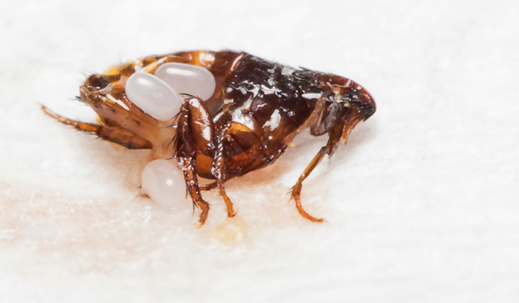6 Ways to Keep Fleas From Biting You
Dealing with flea bites can be incredibly frustrating and uncomfortable. The simplest way to stop fleas from biting you is to clean your surroundings and treat your pets and home for fleas regularly.
Ever wonder why fleas keep coming back despite your best efforts? Discover the most effective strategies to keep fleas at bay and enjoy a bite-free summer.
Key Takeaways
- Fleas can transmit serious diseases to humans, making it crucial to eliminate both the fleas and their bites through cleanliness and targeted treatments.
- Regular cleaning, treating pets, and interrupting the flea life cycle are effective strategies for preventing flea infestations and protecting against bites.
- For persistent or severe flea problems, professional pest control services provide customized solutions to eradicate fleas and prevent future infestations.
How to Keep Fleas From Biting You
.2409200458135.webp)
Fleas aren't just a nuisance for your pets with itchy red spots. These tiny bloodsuckers can also transmit diseases to humans, including serious conditions like typhus and tapeworms.
As a result, getting rid of fleas and their bites becomes essential. It typically takes multiple preventive measures. Each step tackles a different aspect of the problem to ensure comfort and prevent further occurrences.
1. Maintain a Clean Environment
A clean environment makes it harder for fleas to thrive. Fleas can hide in carpets, pet beds, mattresses, and upholstery. With regular cleaning, you disrupt their lifecycle and minimize their population.
To maintain cleanliness around the home, incorporate these actions into your routine:
- Vacuuming: Daily vacuum carpets, rugs, and upholstery.
- Washing Pet Bedding: Use hot water and detergent to clean pet bedding weekly.
- Steam Cleaning: Treat infested areas against adult fleas and larvae.
2. Treat Pets Regularly
Pets are common carriers of dog or cat fleas. As a result, treating pets with flea control products regularly becomes essential to your checklist.
To stop them from spreading and biting humans, consult your veterinarian about these flea treatments:
Flea Treatment | Details |
Flea Shampoo | Use a flea control shampoo during baths. |
Flea Collars | Help repel fleas for an extended period. |
Flea Medications | Veterinarian-prescribed oral medications kill fleas. |
Flea Comb | Remove adult fleas and flea eggs from your pet's fur. |
Topical Treatments | Apply to the skin to target adult fleas and larvae. |
3. Interrupt the Life Cycle
Breaking their life cycle is crucial for long-term control of flea infestation. This involves targeting not only the adults but also their eggs and larvae.
To interrupt the life cycle, you can spray carpets, pet areas, and furniture with flea spray. In addition, pet and human bedding should be washed in hot, soapy water weekly.
4. Use Personal Protective Measures
Personal protective measures reduce the likelihood of getting flea bites. These measures protect human skin from flea saliva, which causes hives, itchiness, and red bumps.
Protective actions include:
- Apply DEET-based insect repellent.
- Wear long sleeves and pants.
- Avoid walking barefoot on surfaces with flea infestation.
5. Adopt Natural and Home Remedies
Natural and home remedies can provide relief and even help reduce flea populations. These options are often gentler on human skin and the environment.
Popular natural remedies include:
Natural Remedies | Description |
Essential Oils | Apply peppermint, eucalyptus, and other oils on infested areas to repel fleas. |
Sprinkle on carpets and pet areas. | |
Homemade Flea Trap | Use a shallow dish with warm water and soap. |
6. Monitor and Manage Outdoors
Managing outdoor areas prevents your yard from becoming a breeding ground for fleas and other pests.
To reduce the flea population indoors, consider outdoor management, such as using flea repellents in spray bottles. Use these products after you trim grass and weeds and clean yard debris.
Professional Pest Control Solutions
Hiring a professional pest control service can be a game-changer in battling fleas. Here's what to expect from them:
- Thorough Inspection: Professional exterminators will inspect your home to identify flea hotspots and assess the severity of the infestation.
- Customized Treatment Plans: Based on the inspection, they develop a tailored plan to tackle the flea problem effectively.
- Safe and Effective Products: They use insecticides and treatments that are safe for humans and pets but deadly to fleas.
- Environmentally Friendly Options: Many services offer eco-friendly solutions that minimize environmental harm.
- Follow-up Visits: They often schedule follow-up visits to ensure the fleas are completely eradicated and prevent re-infestation.
- Advice and Prevention Tips: After treatment, they provide tips on how to keep fleas at bay, including housekeeping and pet care recommendations.
When to Seek Professional Pest Control
Sometimes, dealing with fleas on your own can be tricky. If you've tried everything but they keep coming back, it might be best to seek a professional pest control company (like us at Native Pest Management).
We professionals have the tools and expertise to tackle the flea problem effectively. Don't hesitate to reach out to us when needed.
